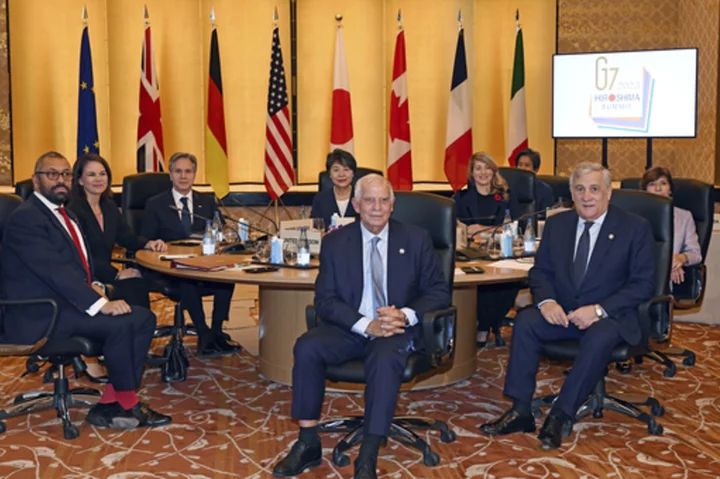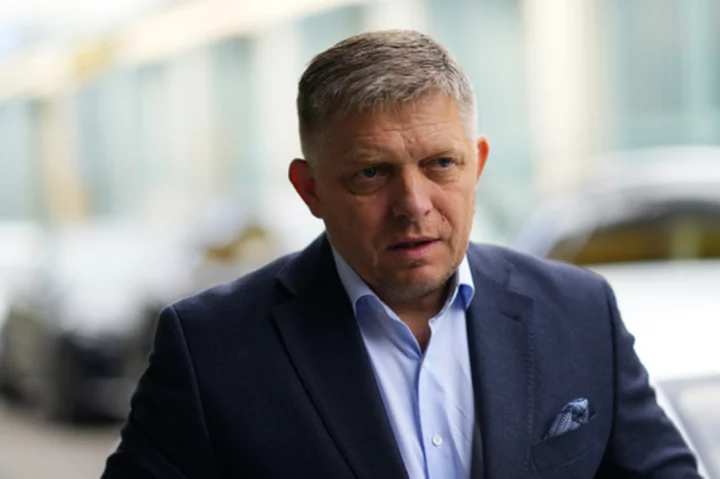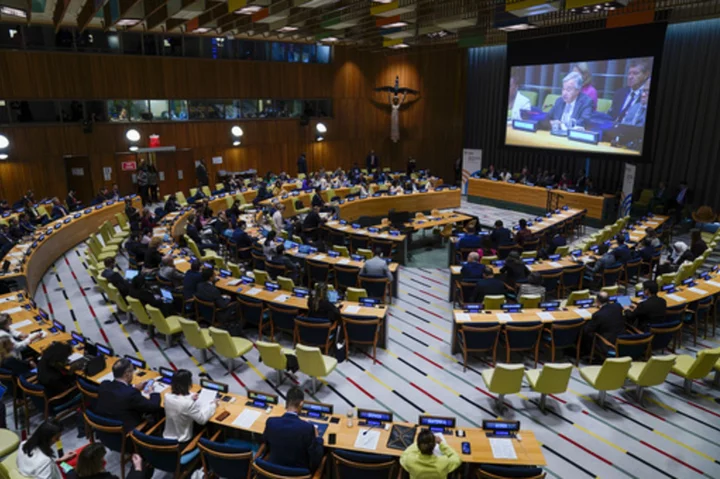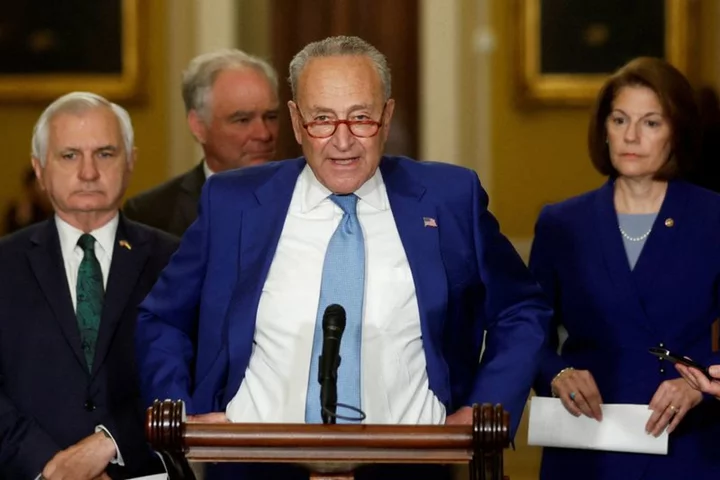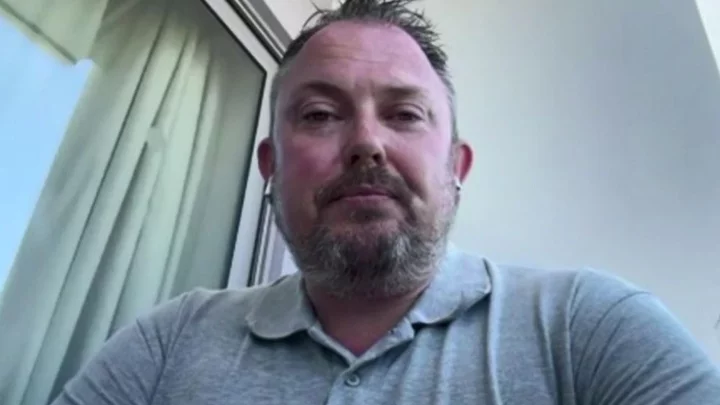TOKYO (AP) — Top diplomats from the Group of Seven leading industrial democracies announced a unified stance on the Israel-Hamas war on Wednesday after intensive meetings in Tokyo, condemning Hamas, supporting Israel’s right to self-defense and calling for “humanitarian pauses” to speed aid to desperate Palestinian civilians in the Gaza Strip.
In a statement, the nations sought to balance criticism of Hamas' attacks against Israel and a push for “urgent action” to help civilians in the besieged Palestinian enclave in need of food, water, medical care and shelter.
U.S. Secretary of State Antony Blinken and foreign ministers from Britain, Canada, France, Germany, Japan and Italy emphasized that they “support humanitarian pauses to facilitate urgently needed assistance, civilian movement and release of hostages.”
There was also condemnation of “the rise in extremist settler violence committed against Palestinians,” which the ministers said is “unacceptable, undermines security in the West Bank, and threatens prospects for a lasting peace.”
As the diplomats met in downtown Tokyo, a U.N. agency said thousands of Palestinians are fleeing south on foot in Gaza with only what they can carry after running out of food and water in the north. Israel said its troops were battling Hamas militants deep inside Gaza City, which was home to about 650,000 people before the war and where the Israeli military says Hamas has its central command and a vast labyrinth of tunnels.
THIS IS A BREAKING NEWS UPDATE. AP’s earlier story follows below.
TOKYO (AP) — The Group of 7 leading industrial democracies worked to forge a unified stance on the Israel-Hamas war at intensive meetings in Tokyo on Wednesday, with U.S. Secretary of State Antony Blinken and other senior diplomats looking to contain a worsening humanitarian crisis and stop a spillover of fighting into the wider Middle East.
The second and final day of the G7 Foreign Minister talks intersects with a flurry of global crises. While the devastating monthlong conflict in Gaza and the humanitarian suffering that has followed Israel’s response to the deadly Oct. 7 Hamas attack lead the agenda, the envoys are also dealing with Russia’s war in Ukraine, North Korea’s nuclear and missile programs and China’s growing aggression in territorial disputes with its neighbors.
Blinken, who arrived in Tokyo after a whirlwind tour of the Middle East, said it’s crucial to find a unified stance on the war in Israel, similar to what diplomats have done over Ukraine and other major issues. The ministers are also trying to keep existing differences on Gaza from deepening.
“This is a very important moment as well for the G7 to come together in the face of this crisis and to speak, as we do, with one clear voice,” Blinken told Japanese Foreign Minister Yoko Kamikawa, shortly after talks Tuesday with Prime Minister Fumio Kishida.
In Tokyo, Blinken and foreign ministers from Britain, Canada, France, Germany, Japan and Italy will be seeking common ground in part to prevent the Gaza war from further destabilizing already shaky security in the broader Middle East and seeking to maintain existing positions on other matters.
An early consensus on Gaza appeared to be building as at least four of the G7 members made statements in favor of strong common stance. And U.S. officials said they were expecting the group to release a communique featuring a common position after the meetings end on Wednesday.
Kishida said “the unity of G7 is needed more than ever with the situation in Israel and Palestine, the situation in Ukraine, and the challenges in the Indo-Pacific region,” his office said in a statement, adding that the prime minister “highly appreciates the leadership and diplomatic efforts by the Biden administration concerning this issue.”
“You have our utmost support,” Kamikawa told Blinken.
German Foreign Minister Annalena Baerbock said that “as G7 countries, we are making clear that Israel has the right and the duty to protect its population and its people in the framework of international law.” She said that she has been discussing with many partners “how we can finally get humanitarian cease-fires off the ground, in terms of time and also geographically.”
Britain’s Foreign Secretary James Cleverly told a select group of journalists, including The Associated Press, that his government only supports a geographically specific “humanitarian pause” and not a wider cease-fire.
“Firstly, we have seen and heard absolutely nothing that makes us believe that Hamas leadership is serious about (a) cease-fire,” he said, adding that a cease-fire would hamper Israel’s ability to defend itself.
Blinken’s efforts include pushing to significantly expand the amount of humanitarian aid being sent to Gaza, getting Israel to agree to “pauses” in its military operation to allow that assistance to get in and more civilians to get out, beginning planning for a post-conflict governance and security structure in the territory and preventing the war from spreading.
Blinken described all of these as “a work in progress” and acknowledged deep divisions over the pause concept. Israel remains unconvinced and Arab and Muslim nations are demanding an immediate full cease-fire, something the United States opposes. There has also been resistance to discussing Gaza’s future, with the Arab states insisting that the immediate humanitarian crisis must be addressed first.
Securing agreement from G7 members, none of which border or are directly involved in the conflict, may be a slightly less daunting challenge for Blinken.
Yet some small cracks have emerged over Gaza, which has inflamed international public opinion. Democracies are not immune from intense passions that have manifested themselves in massive pro-Palestinian and anti-Israel demonstrations in G7 capitals and elsewhere.
Last month in the U.N. Security Council, France voted in favor of a resolution calling for a humanitarian truce in Gaza that was vetoed by the United States because it didn’t go far enough in condemning Hamas’ attack on Israel, which ignited the war. Britain abstained in that vote.
Several days later in the U.N. General Assembly, a non-binding U.S.-Canadian resolution that would have condemned Hamas failed, while a separate resolution calling for an immediate cease-fire overwhelmingly passed. The U.S. voted against the second resolution while France voted in favor. Britain, Canada, Germany, Italy and Japan all abstained.
Since before Russia’s invasion of Ukraine, the G7 has held together in defense of the international order that emerged from the destruction of World War II. Despite some fraying around the edges, the group has preserved a unified front in condemning and opposing Russia’s war.
The group similarly has been of one voice in demanding that North Korea halt its nuclear weapons and ballistic missile programs, that China exercise its growing international clout responsibly, and also in calling for cooperative actions to combat pandemics, synthetic opioids, and threats from the misuse of artificial intelligence.
Blinken arrived in Tokyo from Turkey, the last stop on a four-day trip through the Mideast that began with visits to Israel, Jordan, the West Bank, Cyprus and Iraq. From Japan, he will travel to South Korea and then on to India.

